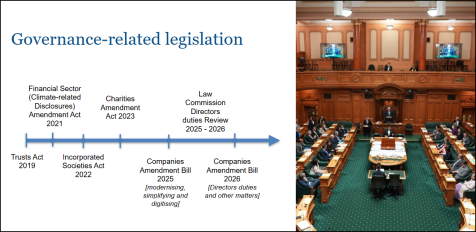Dentons
Health and safety reforms: a legal perspective
Whether the changes reduce the confusion, uncertainty and cost associated with compliance remains to be seen.
Governance is shifting under new laws on trusts, societies, climate reporting, and health and safety. Boards must adapt to stay ahead.

Governance is changing and will do so more in 2025. Slowly but surely, new laws are reshaping how boards operate. A director at one of the Governance Leadership Centre (GLC) roadshow events called it “a large, slow-moving tsunami”. That description fits well. These changes may not seem dramatic on their own, but together they’re creating a powerful wave of change in governance that continues to build momentum.
Let’s unpack what’s happening – and what’s next.

The Trusts Act 2019 gave trust law a much-needed update. Trustees now have clearer duties, and transparency is a bigger focus. Managing a trust today means stepping up and being more accountable.
The Incorporated Societies Act 2022 replaced legislation that had been around since 1908. Societies must update their constitutions, establish proper dispute processes, and meet higher governance standards including managing conflict of interests. Societies need to re-register by April 2026 – plenty of time, but it won’t wait forever and there is a quite a lot to do for societies that have very old constitutions or that haven’t been updated in a while. Committee member (or board member) duties have also been made explicit, even though they applied under common law already.
Charities are under the spotlight too. The Charities Amendment Act 2023 aligns officer duties with the Companies Act 1993 and requires governance reviews every three years. This is about increasing transparency and ensuring charities meet the same high standards as other entities.
Climate-related disclosures have moved into action. Large companies and financial institutions are reporting on governance, risk management, strategies, and metrics and targets in the first phase of reporting. These reports follow global standards and focus on governance and opportunities. If your board is delivering these reports, now is the time to refine and ensure they’re meaningful; and if your board isn’t, it may still be the time to consider what information you may need to provide as a Scope 3 emitter.
The Health and Safety at Work Act 2015 is under its first major review since it came into force nearly a decade ago. While the law was a step forward, New Zealand’s workplace safety outcomes still lag behind Australia and the UK.
The review will look at how governance can drive better results, whether enforcement tools are effective, and how director liability can be strengthened. For boards, this is more than compliance – it’s about leadership. Directors are expected to play an active role in managing workplace risks and there is helpful new guidance on health and safety governance published by the IoD and WorkSafe earlier this year.
The net result of these changes across a range of legislation is more focus on governance and questions such as board and director accountability, and standards of governance. Boards should use this time to review their health and safety oversight and make sure it’s fit for purpose. Strong leadership in this area protects people and ensures organisations of all types, shapes and sizes stay ahead of the curve.
The Companies Act 1993 is also getting a refresh. The first phase will simplify processes, modernise the law and bring it into the digital age. Most of the changes proposed relate to things that should have happened earlier if there had been ongoing legislative “maintenance”. Importantly, the first phase will include addressing the publication of directors’ addresses. The second phase, a review by the Law Commission, will tackle director duties and liabilities, drawing lessons from high-profile cases such as Mainzeal, and looking more broadly at directors’ duties, liability and enforcement across a range of legislation, not just the Companies Act 1993.
In the financial sector, legislative changes will continue to hold directors accountable without punitive personal liability while encouraging sensible risk-based approaches to lending and the marketing of financial products. Striking this balance is essential for fostering innovation without compromising responsibility.
Looking further ahead, potential new laws could address AI, cyber security, modern slavery and nature-related reporting. Some of these are already in place in other countries, and while New Zealand is yet to follow suit, it pays to keep an eye on the horizon for future change. Boards will need to stay alert as these areas evolve and the Governance Leadership Centre will be monitoring this to support members do that.
These changes are shaping governance around clearer rules, clearer enforcement with appropriate liability, and more certain expectations. With governance in the spotlight, directors and boards are likely to face pressure to improve their governance practice with transparency front and centre.
The health and safety review is a prime example of this shift. It seems likely that boards will face pressure to move beyond thinking about health and safety as a box-ticking exercise. There will be pressure to take real ownership of workplace risks and outcomes to the extent that isn’t happening already and hopefully, legislative changes with new approaches to regulating that encourage good practice governance as a foundation for boards to support deliver of improved health and safety outcomes.
At the same time, many reforms focus on boards as the “top of the tree”, without considering how they fit into the wider system. Governance doesn’t happen in isolation, and a more integrated approach is needed. IoD will continue to advocate for more of a systematic approach in the work of the Governance Leadership Centre.
This is the time to check your governance practices. Are your processes up to date and consistent with good practice governance? Are you prepared for what’s ahead? If not, act now.
For example, pay close attention to health and safety. Are risks being actively monitored, or is it just an agenda item? Directors must lead on this issue, not simply react to it. Strong governance in health and safety is about more than compliance – it’s about protecting people and setting the tone for your organisation.
The wave of changes may feel overwhelming, but it’s manageable if you stay proactive. Boards that adapt and stay informed will not only navigate this tsunami but emerge stronger on the other side.
So, roll up your sleeves. Change is here – it’s time to dive in and meet the challenge!
[AI assisted]